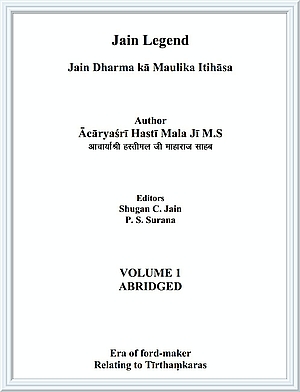Following Lord Vimalanātha, Śrī Anantanātha became the 14th Tīrthaṃkara. In his previous incarnation Śrī Anantanātha was Padmaratha, the king of Ariṣṭā city in Dhātakīkhaṇḍa. He was a courageous and brave king. Though he conquered the entire earth by his prowess yet after a while he took initiation from the preceptor Cittarakṣa and became immersed in the attainment of liberation. By the strength of his austerities and restraint he attained the Tīrthaṃkara nāmakarma. At the end, leaving his material body, in pure meditation, he became a powerful god in the tenth heaven.
On the seventh day of the dark half of the Śravaṇa month under Revatī constellation, his soul left the heaven and entered the womb of Suyaśā, queen of king Siṃhasena of Ayodhya. The mother saw the 14 auspicious dreams and at the end of her pregnancy period delivered a son on the 13th day of the dark half of Vaiśākha month under constellation Revatī. After celebrating the birth of the son for ten days, the king, thinking that 'when the child was in the womb, a huge and difficult army that came to attack had been won over', named the son Anantanātha.
Completing 7 lakh 50 thousand years of his life as a boy when Anantanātha became a young man the king got him married to suitable women and seated him on the royal throne. Having ruled the kingdom justly for 15 lakh years, he resolved to become a monk on prayers by the lokāntika gods. He gave charities for a year and on the 14th day of the dark half of the month Vaiśākha under Revatī constellation, along with 1000 other kings, got initiated as a monk, and renounced all past bad deeds. He observed a fast (belā) which he broke the next day at the home of the king of Varddhamānapura, Vijaya Bhūpa, with rice pudding.
After wandering as a mendicant for three years, Lord Anantanātha reached Sahasrāmravana and became meditative under the Aśoka tree. In the second stage of deep meditation through kṣapakaśreṇi, relieving himself of passions broke all obscuring karmas, and on the 14th day of the dark fortnight of Vaiśākha under Revatī constellation, through a fast, attained pure knowledge. Upon attaining pure knowledge, Lord Anantanātha gave religious sermon and establishing the four-fold creed. He became the Tīrthaṃkara of the period. When he was close to Dwārikā, the Vasudeva of that period Puruṣottama and the Baladeva Suprabha listened to his sermon and attained samyaktva (right perception). Baladeva Suprabha became a monk, having become disenchanted after killing his brother and in the end attained liberation.
The congregation of Lord Anantanātha had 50 gaṇas and Gaṇadharas, 5000 omniscient, 5000 telepaths, 4300 clairvoyants, 900 14-pūrvadhārīs, 8000 vaikriyalabdhidhārīs, 3200 vādīs, 66000 monks, 62000 female monks, 206000 votaries and 414000 female votaries.
After wandering as an omniscient for three years less than 7 lakh years, the Lord observed a month-long fast unto death along with 1000 monks and on the 5th day of the bright fortnight of Caitra under constellation Revatī, having completed a life-span of 30 lakh years, destroying all karmas, became enlightened and attained salvation.
 Acharya Hasti Mala
Acharya Hasti Mala
